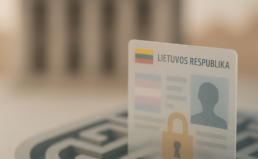The Lithuanian Office of the Inspector of Journalist Ethics concluded that two fairy tales that promote tolerance for same-sex couples are harmful to minors and should be marked by the index “N-14”. According to experts, stories written by the Lithuanian author Neringa Dangvydė violate the Law on the Protection of Minors against the Detrimental Effect of Public Information by “encouraging the concept of entry into a marriage and creation of a family other than stipulated in the Constitution of the Republic of Lithuania and the Civil Code of the Republic of Lithuania”. In addition, the experts consider them to be “harmful, invasive, direct and manipulative”.
The book “Gintarinė širdis” (“Amber heart”) that contains magical stories for children about people with disabilities, same-sex couples, Roma, people with a different skin colour and other socially vulnerable groups is no longer available for purchase and the information about it was removed from a database of the Lithuanian University of Educational Sciences (LEU), which published the book nearly half a year ago.
In one of the stories a brother falls in love with a black male dressmaker, in another one a princess falls in love with the shoemaker’s daughter. The LEU considers this to be “harmful, primitive and purposeful propaganda of homosexuality”. The book’s “negative content” was reported to the LEU and the Ministry of Culture by the “Lithuanian parents’ forum” and a group of conservative MPs.
It is important to note that in 2011 the Constitutional Court of the Republic of Lithuania ruled that the constitutional concept of family cannot be based solely on the institution of marriage. According to the Court, the fact that marriage and family are set in the same paragraph of the Constitution indicates an integral connection between the two. However, marriage is only one of several possible family models. The Court stated that the constitutional concept of family is based on mutual responsibility, understanding, emotional attachment, support and similar connections among family members. It also includes voluntary decisions to take upon some rights and responsibilities. All these elements make up to the essence of a relationship. Therefore, the form that a relationship takes upon bears no significance with regard to the concept of family.
Moreover, according to the Professor of the Faculty of Law of Vilnius University Vytautas Mizaras, the above mentioned decision of the Office of the Inspector of Journalist Ethics not only fails to consider the practice of the Constitutional Court, but also the jurisprudence of the European Court of Human Rights and possibly violates the Article 10 (i.e. the right to freedom of expression) of the European Convention of Human Rights. It is worth reminding that currently there are three pending cases against Russia that concern the prohibition of “homosexual propaganda” (Bayev v. Russia (no. 67667/09), Kiselev v. Russia (no. 44092/12) and Alekseyev v. Russia (no. 56717/12)).
This is the second time when experts quote the norm of the Law on the Protection of Minors Against the Detrimental Effect of Public Information as the reason for censoring the LGBT* related public information. In September 2013 the same experts found that one of the two promotional videos of the Baltic Pride 2013 March for Equality that took place in Vilnius last July were harmful to minors and should have been broadcasted only during the night hours.
Made with reference to the information provided by manoteises.lt, lithuaniatribune.com and 15min.lt




